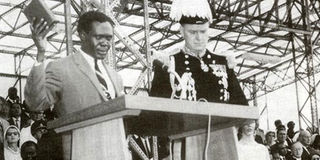Why has peaceful change failed in Uganda?

Former Prime minister and president of Uganda Apollo Milton Obote takes oath on independence day in 1962. PHOTO/FILE
What you need to know:
- Despite the general consensus on the long-due nature of a peaceful political transition, little debate has been dedicated to the question of political transition itself?
No well-meaning Opposition politician in Uganda today will fail to argue that as things stand now, Uganda is still entangled in cycles of politics that has ensured the country does not witness peaceful change from one regime to another since 1962.
Even the promise by President Museveni in the 1980s for national deliverance from the curse of violent regime change hasn’t come to pass. Should it not be ironic, then, that despite the general consensus on the long-due nature of a peaceful political transition, little debate has been dedicated to the question of political transition itself?
We need to ask ourselves why a peaceful transfer of political power has been elusive for Uganda since Independence? With contemporary realities of violence inspired by tribalism, can peaceful transfer of power from one face to another be pursued as a political end in itself, or must it always be linked to some broader political objective? In the latter case, how is the broader political objective framed in our contemporary political debates and struggles?
Think of President Museveni’s take on the subject in the honeymoon years of his government. In his work on post-colonial Uganda, historian Phares Mutibwa quotes President Museveni as critiquing what must have appeared to him as a pervasive political reductionism, one that linked the persistent political crisis to the actions of Obote, Amin, the Okellos, and so on.
Museveni argued that such attitude “blindly equated” these leaders “with the system, that is, the State,” with an equally blinding conclusion that “their removal from power” is the final solution.
Surely, a lot has happened since the 1980s. The seemingly revolutionary discourse of the 1980s subsided significantly, giving way to a dangerous political conservatism - “No change.” With this, anyone must appear unserious to take any of the statements made in the 1980s, which is not to disqualify the statements themselves.
My point, however, is that President Museveni’s comments on power transfer and the postcolonial political crisis have many leads into our own predicament today.
If it is true that the problem is not the individual but the State structure organised in such a way that make political violence inevitable and clinging onto power a necessary outcome; what Mr Museveni’s earlier rebel activity tells us is that the agency of individual leaders mattered considering that they failed to come to terms with problematic postcolonial State structure.
In such conditions, the removal of such individuals from power might set pace for decolonising the State, depending on the nature of political movements that usher in new leaders.
With the benefit of time, we now know too well that due to failure to effectively decolonise the State, leaders ushered into power by the political and armed movement of the 1980s could not, until now, deliver on the promised era of peaceful transfer of powers.
As left-leaning rebels turned into fanatic neo-liberal converts in power, earlier decolonial sentiments were discarded with no remorse.
Perhaps the key point to take note of is the idea that the ongoing struggle for power, in which the question of a peaceful political transition is high on the agenda, must be anchored on the overriding objective of rethinking the political and politics in our postcolonial polity, that is, to decolonise the State.
If the 1980s generation has until now failed both to decolonise the State and to effect peaceful power transfer, that should remain our greatest puzzle, for which we must find a way forward.
Adventino Banjwa,
[email protected]




